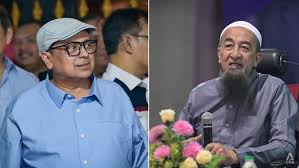Political Islam: Preachers in Malaysia, Indonesia with millions-strong online flocks unafraid of rocking the boat

“One criticism is that we value the charisma of influencers rather than intellectual discourse, the content of the religious teachings itself”
(CNA) – With his casual style of lectures delivered in a thick Terengganu accent, Malaysian Islamic religious leader Ustaz Azhar Idrus has grown in popularity among Muslims in Southeast Asia.
He has more than 1.7 million followers on his social media pages including Facebook, Instagram and TikTok. He is knowledgeable in Islamic jurisprudence and gives advice on different religious topics including finance, morals and even spousal relationships.
Yet, there are some quarters who accuse Ustaz Azhar of being political with his messaging at times, and feel the mixing of politics and religion should not be permitted, especially since a large portion of his audience are impressionable youths.
Over in Indonesia, Jakarta-based preacher Haikal Hassan – unlike Ustaz Azhar – has been far more overt with his political views.
Ustaz Haikal, who has been using social media to preach Islamic values for the past 15 years, boasts over two million followers on Instagram. A previous account with about 6.7 million followers was compromised.
His posts on the social media application of late have been less about religious teachings and more on the political developments in Southeast Asia’s largest economy. Indonesia held its latest election on Feb 14 and it would not be difficult to guess who Ustaz Haikal’s preferred presidential candidate was.
It was Defence Minister Prabowo Subianto, who has since been declared the winner of the election by the country’s General Elections Commission (KPU).
The proliferation of such preachers who are savvy with social media and unafraid to rock the political boat appears to be on the rise, in response to a growing expectation of them to be more vocal on certain issues.
According to a study released by American think-tank Pew Research Centre in 2023, around six in 10 respondents polled in Malaysia and Indonesia say religious leaders should talk publicly about the political parties or politicians they support, with about half even saying they should enter politics.
Also, more than half of the respondents in Malaysia and Indonesia believe religious leaders should take part in political protests, slightly more than the 50 per cent of those polled in Cambodia and eclipsing the 18 to 29 per cent of respondents in Singapore, Sri Lanka and Thailand.
The study surveyed 13,122 adult respondents across six Asian countries between June and September 2022.
Associate Professor Dr Mohd Yusri Ibrahim, chief researcher for think-tank group Ilham Centre, told CNA that many Muslim youths in the region may be keen for the preachers they follow to also speak about politics or participate directly in politics because it is an area in which they lack knowledge.
“Youths, in relative terms, have a poor level of political literacy and their understanding of religion also has not much depth. At the same time, their spirit and determination towards Islam is strong and some are fanatic in following certain popular preachers who are able to explain concepts well, with humour and other ways,” said Assoc Prof Mohd Yusri.
He added that preachers may also be compelled to lecture about politics or even participate directly in election campaigning because parties recognise the influence they wield over voters.
“When it comes to election time, many religious preachers who wield huge influence and are able to pull support of young people towards political parties who back them will be called upon to help. That’s why these preachers are used by specific parties in the course of their campaign; one of the objectives is to garner support from younger voters.

